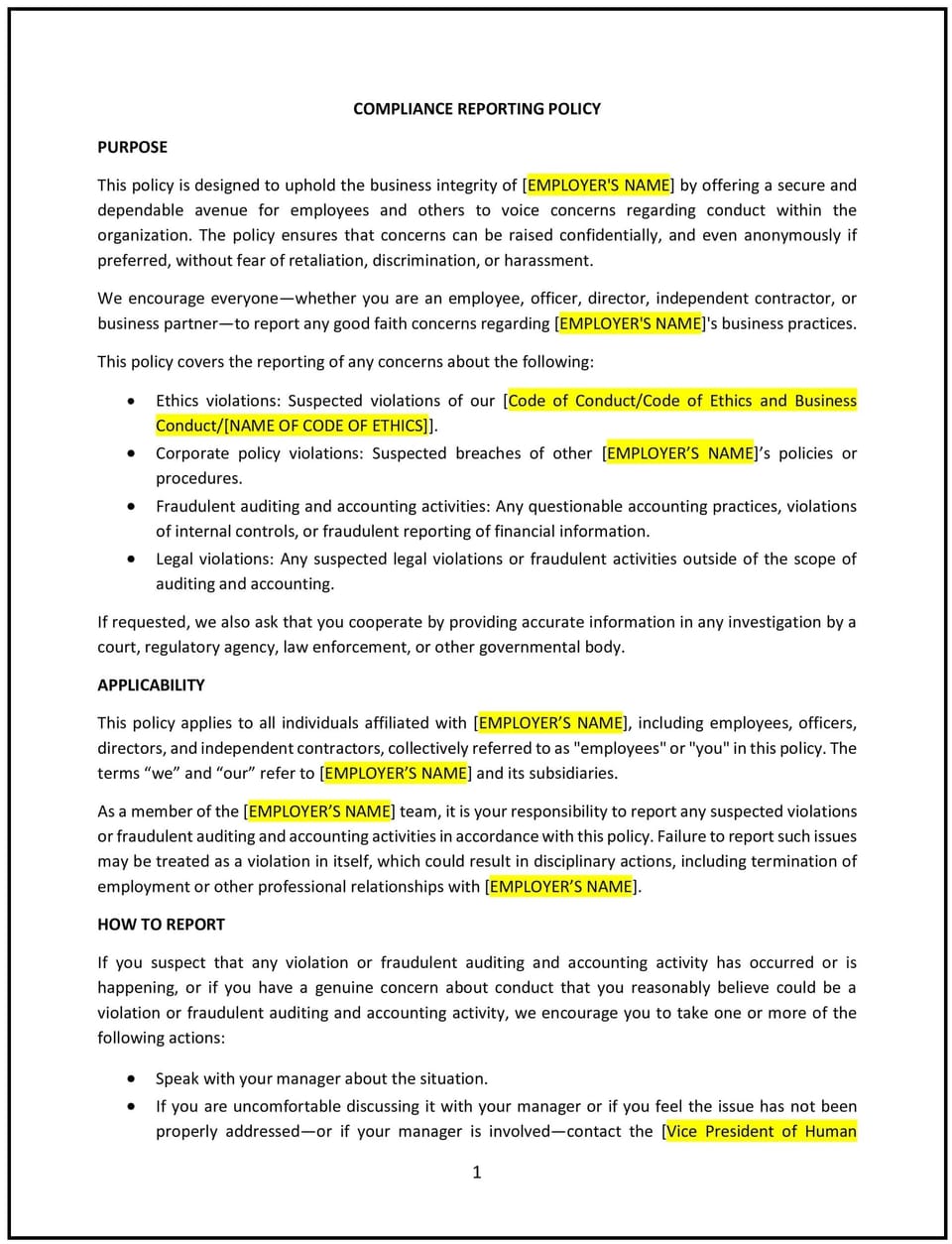Compliance reporting policy (Arizona)

Compliance reporting policy (Arizona)
In Arizona, a compliance reporting policy provides employees with clear guidelines for identifying and reporting violations of laws, regulations, or company policies. This policy is critical for fostering a culture of accountability and transparency, ensuring the business meets legal and ethical standards.
This policy outlines reporting procedures, protections for whistleblowers, and the organization’s commitment to investigating and addressing compliance concerns. By implementing this policy, Arizona businesses can mitigate risks and uphold their reputation.
How to use this compliance reporting policy (Arizona)
- Define reportable issues: Specify the types of concerns employees should report, such as fraud, harassment, safety violations, or regulatory non-compliance.
- Establish reporting channels: Provide multiple options for reporting, such as direct supervisors, HR representatives, or anonymous hotlines, to encourage employee participation.
- Ensure confidentiality: Commit to protecting the identity of individuals who report compliance concerns to the fullest extent possible.
- Protect whistleblowers: Clearly state that retaliation against employees who report concerns in good faith is strictly prohibited.
- Outline investigation procedures: Explain how the organization will investigate reported concerns, including timelines and follow-up actions.
Benefits of using a compliance reporting policy (Arizona)
This policy offers key advantages for Arizona businesses:
- Enhances accountability: Encourages employees to report violations, helping the organization address issues proactively.
- Supports compliance: Aligns with Arizona and federal laws, reducing the risk of penalties or legal disputes.
- Protects employees: Safeguards whistleblowers from retaliation, fostering a safe and supportive workplace culture.
- Strengthens trust: Demonstrates the company’s commitment to ethical practices and transparency.
- Mitigates risks: Identifies and resolves compliance issues early, minimizing financial and reputational damage.
Tips for using a compliance reporting policy (Arizona)
- Address Arizona-specific regulations: Ensure the policy reflects local laws and industry requirements, such as those relevant to healthcare or construction.
- Provide training: Educate employees on how to recognize and report compliance concerns and understand their rights under the policy.
- Maintain clear documentation: Keep thorough records of all reported concerns and the actions taken to address them for legal and audit purposes.
- Regularly review and update: Revise the policy as laws, regulations, or organizational needs evolve to maintain effectiveness.
- Promote awareness: Regularly communicate the importance of compliance reporting and remind employees of the available reporting channels.
Q: What types of concerns should employees report under this policy?
A: Employees should report any violations of laws, regulations, or company policies, such as fraud, harassment, safety violations, or unethical conduct.
Q: How can employees report compliance concerns?
A: Employees can report concerns through various channels, such as their manager, HR, or an anonymous hotline, as outlined in the policy.
Q: What protections are in place for whistleblowers?
A: The policy prohibits retaliation against employees who report concerns in good faith, ensuring their safety and support throughout the process.
Q: How are reported concerns investigated?
A: The company will promptly investigate all reports, maintaining confidentiality and taking appropriate corrective actions based on the findings.
Q: How does this policy help with compliance in Arizona?
A: It ensures the organization adheres to Arizona laws and industry standards by addressing compliance concerns effectively and proactively.
This article contains general legal information and does not contain legal advice. Cobrief is not a law firm or a substitute for an attorney or law firm. The law is complex and changes often. For legal advice, please ask a lawyer.


